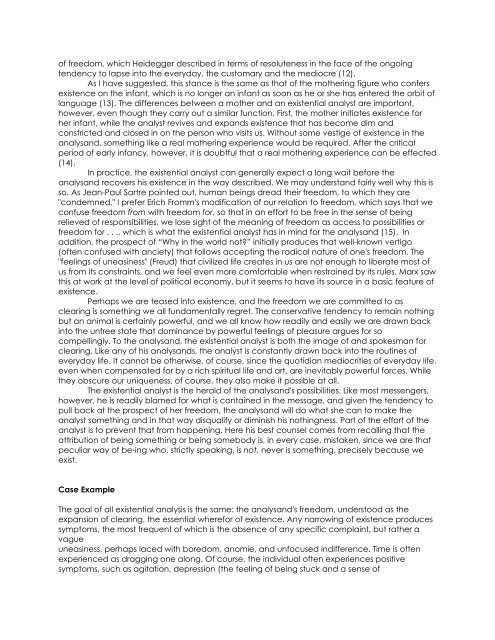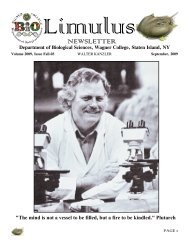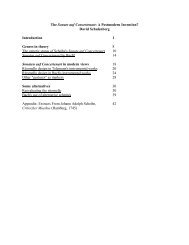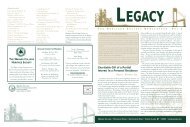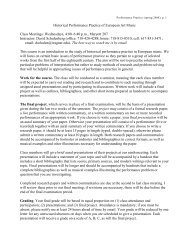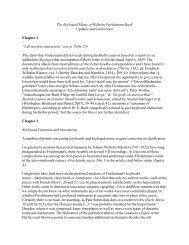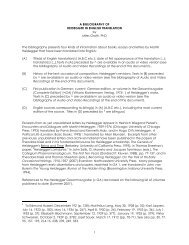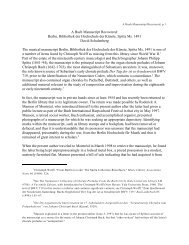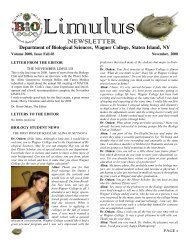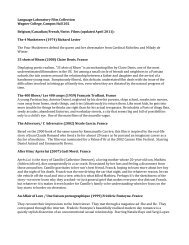SEVEN PAPERS ON EXISTENTIAL ANALYSIS ... - Wagner College
SEVEN PAPERS ON EXISTENTIAL ANALYSIS ... - Wagner College
SEVEN PAPERS ON EXISTENTIAL ANALYSIS ... - Wagner College
You also want an ePaper? Increase the reach of your titles
YUMPU automatically turns print PDFs into web optimized ePapers that Google loves.
of freedom, which Heidegger described in terms of resoluteness in the face of the ongoing<br />
tendency to lapse into the everyday, the customary and the mediocre (12).<br />
As I have suggested, this stance is the same as that of the mothering figure who confers<br />
existence on the infant, which is no longer an infant as soon as he or she has entered the orbit of<br />
language (13). The differences between a mother and an existential analyst are important,<br />
however, even though they carry out a similar function. First, the mother initiates existence for<br />
her infant, while the analyst revives and expands existence that has become dim and<br />
constricted and closed in on the person who visits us. Without some vestige of existence in the<br />
analysand, something like a real mothering experience would be required. After the critical<br />
period of early infancy, however, it is doubtful that a real mothering experience can be effected<br />
(14).<br />
In practice, the existential analyst can generally expect a long wait before the<br />
analysand recovers his existence in the way described. We may understand fairly well why this is<br />
so. As Jean-Paul Sartre pointed out, human beings dread their freedom, to which they are<br />
"condemned." I prefer Erich Fromm's modification of our relation to freedom, which says that we<br />
confuse freedom from with freedom for, so that in an effort to be free in the sense of being<br />
relieved of responsibilities, we lose sight of the meaning of freedom as access to possibilities or<br />
freedom for . . ., which is what the existential analyst has in mind for the analysand (15). In<br />
addition, the prospect of “Why in the world not?” initially produces that well-known vertigo<br />
(often confused with anciety) that follows accepting the radical nature of one's freedom. The<br />
"feelings of uneasiness" (Freud) that civilized life creates in us are not enough to liberate most of<br />
us from its constraints, and we feel even more comfortable when restrained by its rules. Marx saw<br />
this at work at the level of political economy, but it seems to have its source in a basic feature of<br />
existence.<br />
Perhaps we are teased into existence, and the freedom we are committed to as<br />
clearing is something we all fundamentally regret. The conservative tendency to remain nothing<br />
but an animal is certainly powerful, and we all know how readily and easily we are drawn back<br />
into the unfree state that dominance by powerful feelings of pleasure argues for so<br />
compellingly. To the analysand, the existential analyst is both the image of and spokesman for<br />
clearing. Like any of his analysands, the analyst is constantly drawn back into the routines of<br />
everyday life. It cannot be otherwise, of course, since the quotidian mediocrities of everyday life,<br />
even when compensated for by a rich spiritual life and art, are inevitably powerful forces. While<br />
they obscure our uniqueness, of course, they also make it possible at all.<br />
The existential analyst is the herald of the analysand's possibilities. Like most messengers,<br />
however, he is readily blamed for what is contained in the message, and given the tendency to<br />
pull back at the prospect of her freedom, the analysand will do what she can to make the<br />
analyst something and in that way disqualify or diminish his nothingness. Part of the effort of the<br />
analyst is to prevent that from happening. Here his best counsel comes from recalling that the<br />
attribution of being something or being somebody is, in every case, mistaken, since we are that<br />
peculiar way of be-ing who, strictly speaking, is not, never is something, precisely because we<br />
exist.<br />
Case Example<br />
The goal of all existential analysis is the same: the analysand's freedom, understood as the<br />
expansion of clearing, the essential wherefor of existence. Any narrowing of existence produces<br />
symptoms, the most frequent of which is the absence of any specific complaint, but rather a<br />
vague<br />
uneasiness, perhaps laced with boredom, anomie, and unfocused indifference. Time is often<br />
experienced as dragging one along. Of course, the individual often experiences positive<br />
symptoms, such as agitation, depression (the feeling of being stuck and a sense of


